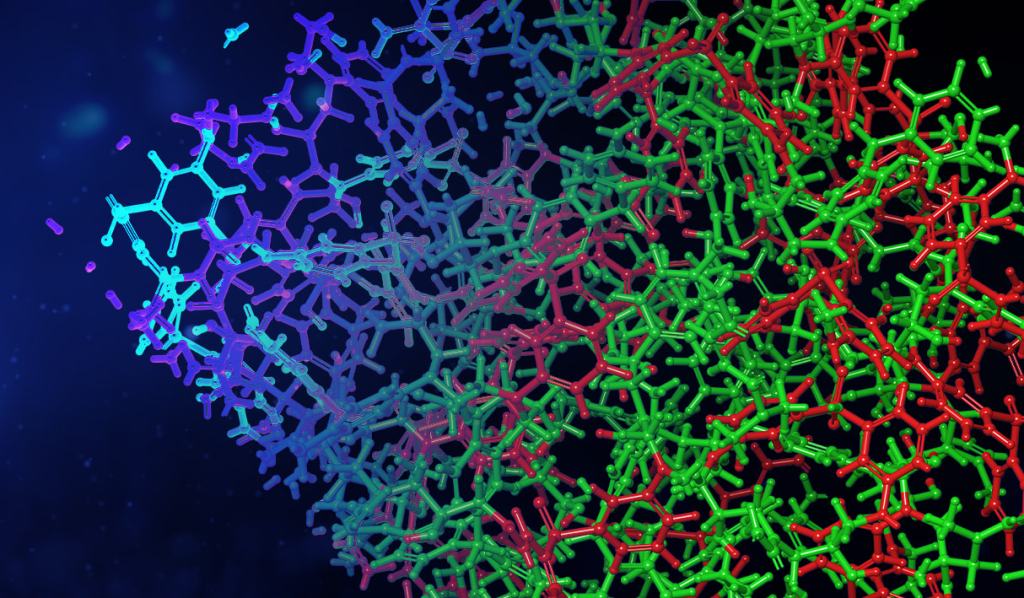- Predict binding to polymer molecules and interfaces, small molecule leaching, and gas permeation for applications in medical device, consumer packaged goods, and membranes
- Calculate polymer Rg in solution to understand the solvation in lubricants, cosmetics, and more
- Determine the impact of components and conditions on aggregation and phase behavior


Harness molecular simulation to develop tomorrow’s polymeric materials
R&D scientists across broad industries face challenges in developing the next-generation of polymers and composites that are high-performance, multifunctional, and meet society’s demands for sustainability.
Schrödinger’s digital chemistry platform allows scientists to understand and predict product performance through simulations of polymers at molecular and atomic scales, to tackle materials challenges across diverse polymer applications.

Intuitive computational workflows designed by polymer experts
Easy-to-use system builders for all polymer types
Powerful workflows for molecular simulation, machine learning, and data analysis
Dedicated customer support and extensive training resources
Predict key properties to drive polymer development & design
Design new monomers, gain a deeper understanding of polymer synthesis and degradation, and improve polymer formulations.
Better understand polymer and fluid formulations
Deliver more efficient electronic polymers
- Simulate interactions of packaging polymers with processing solvents and water to predict stability during use
- Simulate atomic interactions and transport of ions in liquid and polymer electrolytes
- Calculate electronic and optical properties
Discover new biopolymers
- Simulate and predict properties of high-performance resins made from bio-based materials, and automate discovery of new biomaterials
- Predict miscibility, structure, and properties of bio-based polymer mixtures
- Simulate the behavior of bio-based polymers in solution
Identify high-performance polymer composites
- Model water uptake and co-continuous morphological stability in polymer composites
- Predict glass transition, thermal stability, and thermal expansion with new polymers
- Predict polymer gel point during curing process
Platform in action
Case studies & webinars
Molecular dynamics simulations accelerate the development and optimization of recyclable tire materials
Molecular dynamics simulations accelerate the development and optimization of recyclable tire materials
Driving innovation in polymer R&D with molecular simulation & machine learning
Driving the development of bio-based polymers with molecular simulation
Address polymer challenges across industries
Automotive
Develop high-performance polymers that are durable, lightweight, sustainable and processable.
Learn moreSpecialty Polymers
Enhance performance and production of raw materials for downstream applications.
Learn moreBatteries
Discover the best-performing polymer electrolyte materials and improve battery performance.
Learn morePharmaceutical Formulation
Optimize the design of drug carriers and formulations for effective drug delivery.
Learn moreCPG Packaging
Innovate with natural materials for high-performance, sustainable packaging materials.
Learn moreAerospace
Design high-performance composites and sealants for high-temperature applications and flame stability.
Learn more
Molecular modeling for materials science applications: Polymeric materials course
Online certification course: Level-up your skill set in polymer modeling
Learn how to apply industry-leading computational software to predict key properties of simple and complex polymer mixtures with automated workflows and machine learning models.
- Self-paced learning content
- Hands-on access to Schrödinger software
- Guided and independent case studies
Key Products
Learn more about the key computational technologies available to progress your research projects.
MS Penetrant Loading
Molecular dynamics (MD) modeling for predicting water loading and small molecule gas adsorption capacity of a condensed system
MS Transport
Efficient molecular dynamics (MD) simulation tool for predicting liquid viscosity and diffusions of atoms and molecules
Desmond
High-performance molecular dynamics (MD) engine providing high scalability, throughput, and scientific accuracy
MS CG
Efficient coarse-grained (CG) molecular dynamics (MD) simulations for large systems over long time scales
OPLS4 & OPLS5 Force Field
A modern, comprehensive force field for accurate molecular simulations
DeepAutoQSAR
Automated, scalable solution for the training and application of predictive machine learning models
MS Dielectric
Automatic workflow to calculate dielectric properties and refractive index
Training Tutorials
Polymer descriptors for machine learning
View tutorialBuilding, equilibrating and analyzing amorphous polymers
View tutorialPolymer property prediction
View tutorialCrosslinking Polymers
View tutorialPublications
Browse the list of peer-reviewed publications using Schrödinger technology in related application areas.
Melt-state degradation mechanism of poly (ether ketone ketone): the role of branching on crystallization and rheological behavior
Croshaw, C. et al. Polym. Degrad. Stab. 2022, 200, 109968
High-throughput molecular dynamics simulations and validation of thermophysical properties of polymers for various applications
Afzal. A et al. ACS Appl. Polym. Mater. 2021, 3, 2, 620–630
Polycyanurates via Molecular Dynamics: In Situ Crosslinking from Di(Cyanate Ester) Resins and Model Validation through Comparison to Experiment.
Moore L. M. J. et al. Macromolecules 2021, 54, 13, 6275–6284
Software and services to meet your organizational needs
Software Platform
Deploy digital materials discovery workflows with a comprehensive and user-friendly platform grounded in physics-based molecular modeling, machine learning, and team collaboration.
Research Services
Leverage Schrödinger’s expert computational scientists to assist at key stages in your materials discovery and development process.
Support & Training
Access expert support, educational materials, and training resources designed for both novice and experienced users.


